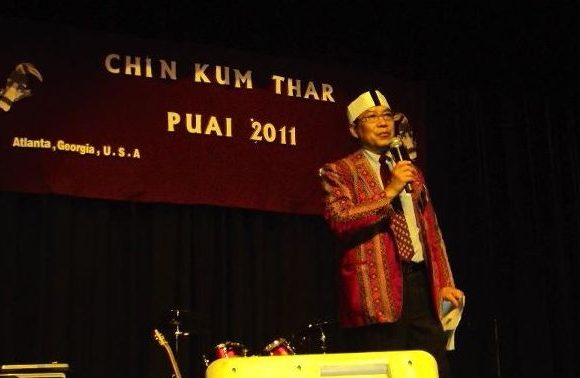“We cannot earn public trust”: Interview with CLD Secretary Salai Aung Ling

“We cannot earn public trust”: Interview with CLD Secretary Salai Aung Ling
16 February 2016 — The Chin League for Democracy is one of the 13 political parties that competed in Burma’s 2015 general elections in Chin State. It contested in 19 constituencies in all the townships, apart from Tonzang and Paletwa.
However, the party did not win any seat. In this interview conducted by the Chinland Guardian, Salai Aung Ling, Secretary – I of the party talked about the reasons why they didn’t succeed, what the new government should focus and future plans for the party.
Chinland Guardian: What were the main reasons why the party did not do well in Chin State?
Salai Aung Ling: The first reason why we did not do well was owing to our late campaign not just for the party as a whole but for the election. We formed the party in April 2014 and it was officially registered in July in the midst of monsoon, which made travelling to villages very difficult to promote the policies of the party. Therefore, we had only a short time to reach Chin people before the election.
The second reason, I think, is a shift of political landscape in the whole country. In retrospect, when we looked at the 2010 General Election, the Chin politics was either ethnic-oriented or personal-oriented. What I mean by that is that voters would carefully observe the ethnicity of the candidates and their background. Therefore, the main reason why most of the candidates elected in the 2010 election won was because of the votes that had come from their tribal people. That was no longer the case in 2015. The approach became party-oriented or leader-oriented. So, our strategy based on the results of the 2010 election failed owing to the popularity of Daw Aung San Suu Kyi and her party.
Last but not least, another reason was owing to the Article 261 of the 2008 Constitution. According to this Article, we cannot form the State government without the approval of the winning Union party, no matter how many seats we get in the State parliament. That became our Achilles’ heel, our weak point, when we did our campaign. Worst of all, the ruling party – Union Solidarity and Development Party – spent too much budget on constituencies represented by their MPs so people think only MPs from the Union-level ruling party can meet their needs and effectively represent them.
Chinland Guardian: Do you think the whole process of the election in Chin State was free and fair?
Salai Aung Ling: To compare with what we had expected, it was quite fair. Maybe, that was because the margins of victory for the winning candidates were so wide that most electorates accepted the result. However, there were some exceptional cases which we did not complain out of courtesy. Some of the frauds and crime committed actually came from where we did not expect.
Chinland Guardian: People talk a lot about the need for all the Chin political parties to merge into one party for the next election. What is your opinion and do you think it is practically possible?
Salai Aung Ling: I agree that there are too many Chin parties. Because of that, we cannot earn public trust; we are wasting our resources; we are weakening ourselves by rivalling each other; and finally we are exposing our lack of unity. As a result, people opted for the NLD which they think is more reliable. If we really want to win the public trust, we first need to show our unity, then our reliability and capability. In other words, we need to show that we are a party strong enough to win an election, form a government on our own and to meet their needs as their party and their government. To do so, all Chin parties need to merge into a single party.
However, it may be practically impossible. The first problem may be because of the trust we have lost from the public owing to the failure in the past when the two parties, Chin National Party (now Chin National Democratic Party) and Chin Progressive Party, made an attempt to form a single party but failed, and then, owing to the breaching of our 2015 pre-electoral agreement by some parties. Nevertheless, if we really love our people and our land, it is always possible.
Chinland Guardian: It is likely that the NLD will form the government at both Union and State levels. What should they give priority on for people in Chin State?
Salai Aung Ling: At the Union level, they should focus on the constitutional amendment because only if and when we can amend some Articles that limit both the state-level legislative power and administrative power, the State government can effectively work for the people.
At the State level, they should prioritise basic infrastructure: we need more roads which can be used throughout all seasons of the year for transportation; and we need more electricity, water supply and good sanitation system in both urban and rural areas.
Secondly, they should focus on state-level planning for the development of the State. The outgoing government was busy only managing limited budget allowed by the central government. The economic growth of a country or state is measured by its GDP (Gross Domestic Product), which is how much we annually earn from our products, not by its expenditure. So the government needs to have plans and projects to invest in locally based factories and plants to produce more products, which can consequently create jobs and thereby, upgrade people’s living standards. Let us assume that there are more than a two hundred thousand workforce in Chin State, I think more than half of them earn less than enough to make a living. So the State government needs to have feasible planning to create jobs for the locals.
Thirdly, the next State government needs to make sure that the State budget is equally distributed to each township or each constituency. The outgoing government spent more in the constituencies of the cabinet members than other constituencies represented by just MPs so the developments of some townships become imbalanced and one-sided.
Chinland Guardian: What items are on the agenda of the party for the next five years before the next election?
Salai Aung Ling: Since we lost the 2015 general election, we do not have any role to play in the parliament. However, we can still check and balance from outside. What’s more, we are now engaging in a political dialogue called Union Peace Conference and we are working hard to set our policies as agendas for discussion in the dialogue.
Secondly, we want to review the 2015 general election and the functions of all the township committees, and reform our party, if necessary, by convening a conference. Thirdly, we want to work with other Chin parties to find a common ground on which we can emerge as one party. Next, we want to watch the function of the government and balance it outside the parliament either via media or by co-operation.
Finally, learning from our failure in 2015, we want to make ourselves ready for the next election by making sure that we reach every single Chin village and promote our policies. All Chin political parties play important roles in census collection, relief works, peace process and other Chin affairs. So, the CLD is co-operating with other Chin parties and working for our people even though we did not win any seat. We will still stand for our identity and work for the benefit of our people. That is what we are for.
Chinland Guardian: What will be the new strategies for your party in preparation for the next election?
Salai Aung Ling: As said, the reason the CLD lost the election was, firstly, owing to our late registration. Now, we have five years to prepare to get in touch with our people at grass-roots level and promote our policies. We want to choose strategic areas where we can conduct meetings, conferences and training on the subjects of democracy, human rights, federal system and so on. By doing so, we can raise public awareness and we can also convince people what we stand for as a political party thereby, winning public trust.
The second reason, which I said, was because of the popularity of Daw Aung San Suu Kyi and her party. The NLD is a party with a political legacy in which people put their trust and lay their hope. So, their candidates easily won the recent election. But that may no longer be the case in 2020. Then, the NLD will have been in office for four years and people will have been able to easily identify some of the broken promises and the failing policies. That is not to say the NLD will break promises and fail people. The NLD may be a very good government but one thing which is undeniably true is that not every government can meet the need of the people. So, people will come to realise what Chin parties stand for and they can easily distinguish the differences between Union parties and ethnic parties. Therefore, our chance to win in 2020 rests on how much we work in this five-year term.
Thirdly, this time we want to hold a conference, reform the EC members and township committees where necessary, and select qualified candidates in advance and provide them training before the actual election campaign. Finally, we want to make sure that we have our party committees and members in every single village of Chin State and other parts of the country wherever Chin people live. By doing so, we will be well prepared before the 2020 election.
Chinland Guardian: Your message to the Chin people.
Salai Aung Ling: Although we lost the election, we want to thank people for faithfully supporting our policies and candidates. We want to make sure that we lost it not because our policies failed and they didn’t work but because we did not have enough time to convince the people of why we contested the election. We want to apologise them for failing their hope and trust. But we still want them to keep trusting in our policies and us in the coming election. We want to promise them that we will work harder. #






